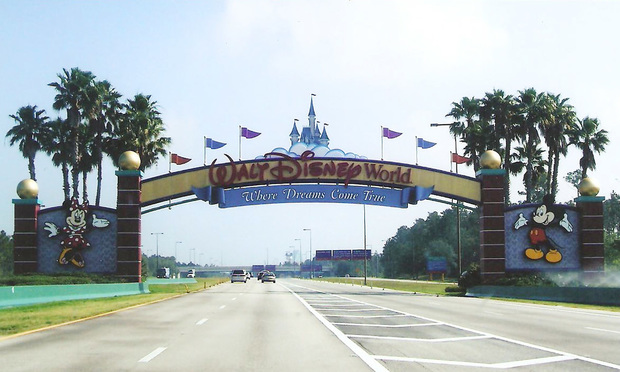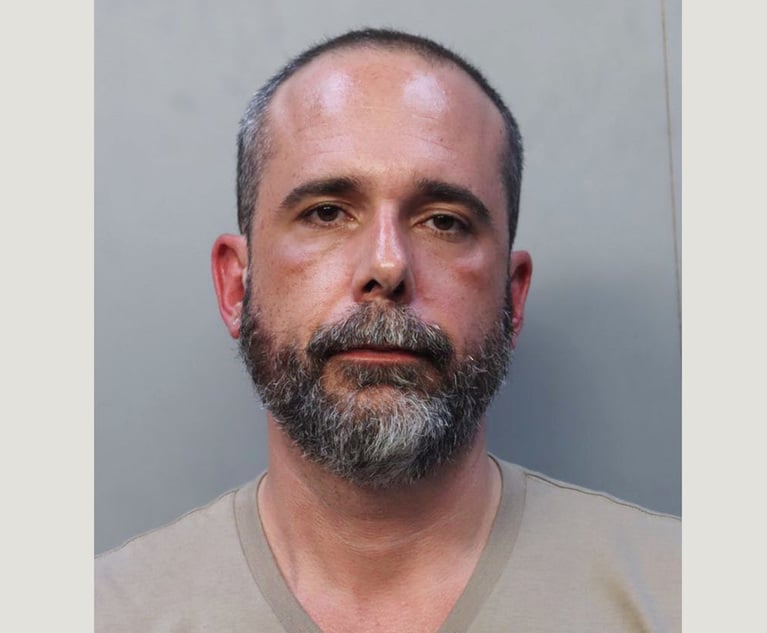Federal Lawsuits Revived on Autism Accommodations at Disney
The appeals court decision came in 30 consolidated cases that involve allegations under the Americans with Disabilities Act and deal with Disney parks in Florida and California.
August 21, 2018 at 12:18 PM
4 minute read
 Walt Disney World/Photo: Dom497 via Wikimedia Commons
Walt Disney World/Photo: Dom497 via Wikimedia Commons
In a detailed, 65-page ruling, a federal appeals court said a trial is needed in a legal battle about whether Disney theme parks have taken adequate steps to meet the needs of customers who have autism and cannot wait long times for rides.
A lower-court judge had granted summary judgment for Walt Disney Parks and Resorts — ruling without holding a full-blown trial — in lawsuits filed on behalf of people with autism. But a three-judge panel of the U.S. Court of Appeals for the Eleventh Circuit on Friday sent the case back and said some key issues need to be resolved in a trial.
The appeals court decision came in 30 consolidated cases that involve allegations under the Americans with Disabilities Act and deal with Disney parks in Florida and California. The decision does not resolve the underlying issues, but it gives the plaintiffs another chance to try to prove allegations that accommodations at the parks are not adequate.
The cases focus on problems that people with autism have in waiting for rides and their need for pre-set orders of events, with the appeals court saying that parents had testified about autistic children having “meltdowns” when they wait for rides or routines are disrupted.
“Plaintiffs allege that their severe disabilities include an inability to comprehend the concept of time, defer gratification, and wait for rides, as well as strict adherence to a pre-set routine of rides in a specific order,” said Friday's ruling, written by Judge Frank Hull and joined by Judges Kevin Newsom and C. Ashley Royal. “Plaintiffs therefore contend that access to all of Disney's rides must be both nearly immediate and in each plaintiff's individual, pre-set order to accommodate fully their impairments.”
But Disney has argued it properly accommodates the needs of people with autism through a “Disability Access Service” program that it began in 2013. The appeals court said the program provides “significant benefits,” including allowing people with disabilities to get scheduled times for rides; allowing them to avoid having to physically stand in line for rides; and allowing them to immediately enter rides that have waits of less than 15 minutes.
In a 2016 summary judgment ruling for Disney, U.S. District Judge Anne Conway wrote that Disney began the Disability Access Service program to replace an earlier program that had been abused by park-goers, including by people who did not need special accommodations. Ruling in a case whose plaintiff was identified by the initials A.L., Conway wrote that the Disability Access Service program and what are known as “readmission” passes “afford plaintiff a similar, or better, experience as those not needing them.”
“Plaintiff was given an opportunity to experience Magic Kingdom in a similar manner as guests that do not need accommodations. … In the present case, nondisabled guests visit Magic Kingdom for rides and attractions that most of them have to wait more than an hour to experience,” wrote Conway, a judge in the federal Middle District of Florida. “Comparing this to plaintiff's experience, DAS and readmission passes allow him access to those same rides in a fraction of the time.”
The appeals court Friday said the plaintiffs are seeking a maximum wait of 10 to 15 minutes for all rides. The ruling acknowledged that the Disabled Access Service program allows people with autism to access rides quicker than other park customers but indicated that doesn't resolve the legal questions.
“Although the DAS card is a significant benefit, we conclude that factual disputes still exist about behavioral features of plaintiffs' impairments that make it more difficult to evaluate whether the DAS program provides a like experience [as other customers have],” the ruling said. “Plaintiffs' evidence posits that waiting for rides in the over-stimulated environment of a theme park, even virtually with the DAS card, is beyond the capacity of plaintiffs given the specific and severe nature of their disabilities.”
Jim Saunders reports for the News Service of Florida.
This content has been archived. It is available through our partners, LexisNexis® and Bloomberg Law.
To view this content, please continue to their sites.
Not a Lexis Subscriber?
Subscribe Now
Not a Bloomberg Law Subscriber?
Subscribe Now
NOT FOR REPRINT
© 2025 ALM Global, LLC, All Rights Reserved. Request academic re-use from www.copyright.com. All other uses, submit a request to [email protected]. For more information visit Asset & Logo Licensing.
You Might Like
View All
Auto Dealers Ask Court to Pump the Brakes on Scout Motors’ Florida Sales
3 minute read
Saul Ewing Loses Two Partners to Fox Rothschild, Marking Four Fla. Partner Exits in Last 13 Months
3 minute read
Trending Stories
Who Got The Work
J. Brugh Lower of Gibbons has entered an appearance for industrial equipment supplier Devco Corporation in a pending trademark infringement lawsuit. The suit, accusing the defendant of selling knock-off Graco products, was filed Dec. 18 in New Jersey District Court by Rivkin Radler on behalf of Graco Inc. and Graco Minnesota. The case, assigned to U.S. District Judge Zahid N. Quraishi, is 3:24-cv-11294, Graco Inc. et al v. Devco Corporation.
Who Got The Work
Rebecca Maller-Stein and Kent A. Yalowitz of Arnold & Porter Kaye Scholer have entered their appearances for Hanaco Venture Capital and its executives, Lior Prosor and David Frankel, in a pending securities lawsuit. The action, filed on Dec. 24 in New York Southern District Court by Zell, Aron & Co. on behalf of Goldeneye Advisors, accuses the defendants of negligently and fraudulently managing the plaintiff's $1 million investment. The case, assigned to U.S. District Judge Vernon S. Broderick, is 1:24-cv-09918, Goldeneye Advisors, LLC v. Hanaco Venture Capital, Ltd. et al.
Who Got The Work
Attorneys from A&O Shearman has stepped in as defense counsel for Toronto-Dominion Bank and other defendants in a pending securities class action. The suit, filed Dec. 11 in New York Southern District Court by Bleichmar Fonti & Auld, accuses the defendants of concealing the bank's 'pervasive' deficiencies in regards to its compliance with the Bank Secrecy Act and the quality of its anti-money laundering controls. The case, assigned to U.S. District Judge Arun Subramanian, is 1:24-cv-09445, Gonzalez v. The Toronto-Dominion Bank et al.
Who Got The Work
Crown Castle International, a Pennsylvania company providing shared communications infrastructure, has turned to Luke D. Wolf of Gordon Rees Scully Mansukhani to fend off a pending breach-of-contract lawsuit. The court action, filed Nov. 25 in Michigan Eastern District Court by Hooper Hathaway PC on behalf of The Town Residences LLC, accuses Crown Castle of failing to transfer approximately $30,000 in utility payments from T-Mobile in breach of a roof-top lease and assignment agreement. The case, assigned to U.S. District Judge Susan K. Declercq, is 2:24-cv-13131, The Town Residences LLC v. T-Mobile US, Inc. et al.
Who Got The Work
Wilfred P. Coronato and Daniel M. Schwartz of McCarter & English have stepped in as defense counsel to Electrolux Home Products Inc. in a pending product liability lawsuit. The court action, filed Nov. 26 in New York Eastern District Court by Poulos Lopiccolo PC and Nagel Rice LLP on behalf of David Stern, alleges that the defendant's refrigerators’ drawers and shelving repeatedly break and fall apart within months after purchase. The case, assigned to U.S. District Judge Joan M. Azrack, is 2:24-cv-08204, Stern v. Electrolux Home Products, Inc.
Featured Firms
Law Offices of Gary Martin Hays & Associates, P.C.
(470) 294-1674
Law Offices of Mark E. Salomone
(857) 444-6468
Smith & Hassler
(713) 739-1250







